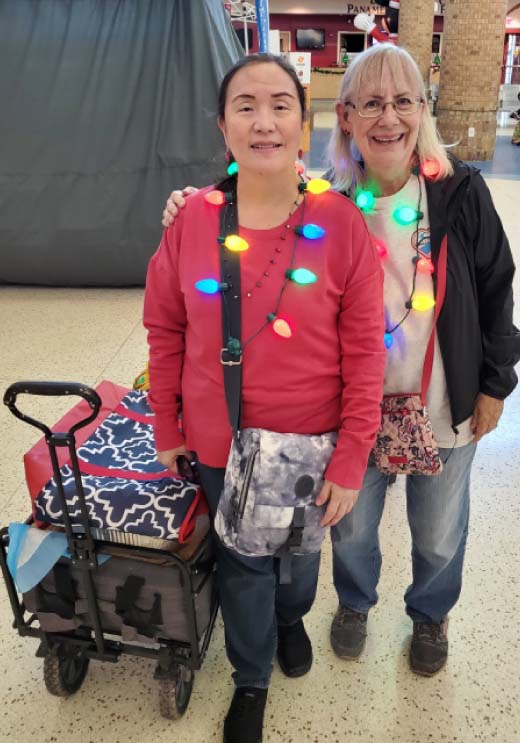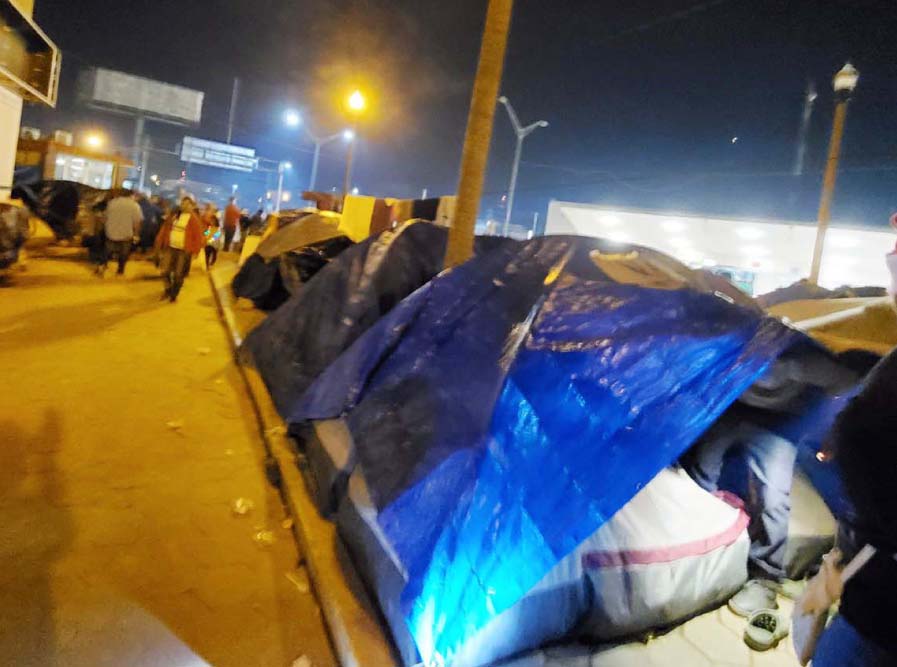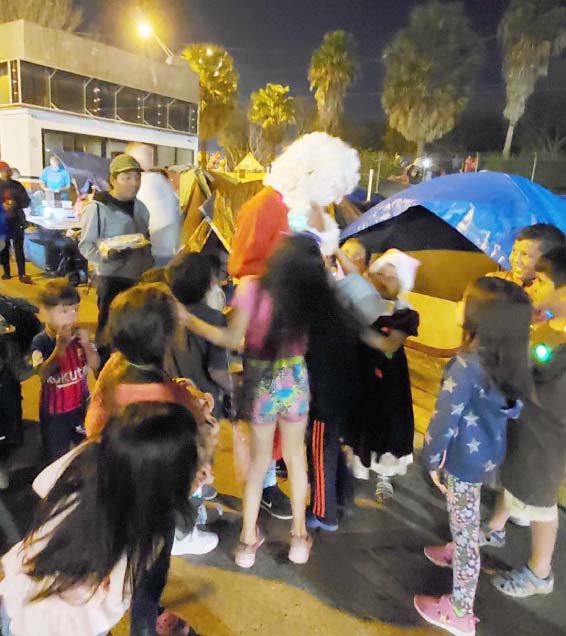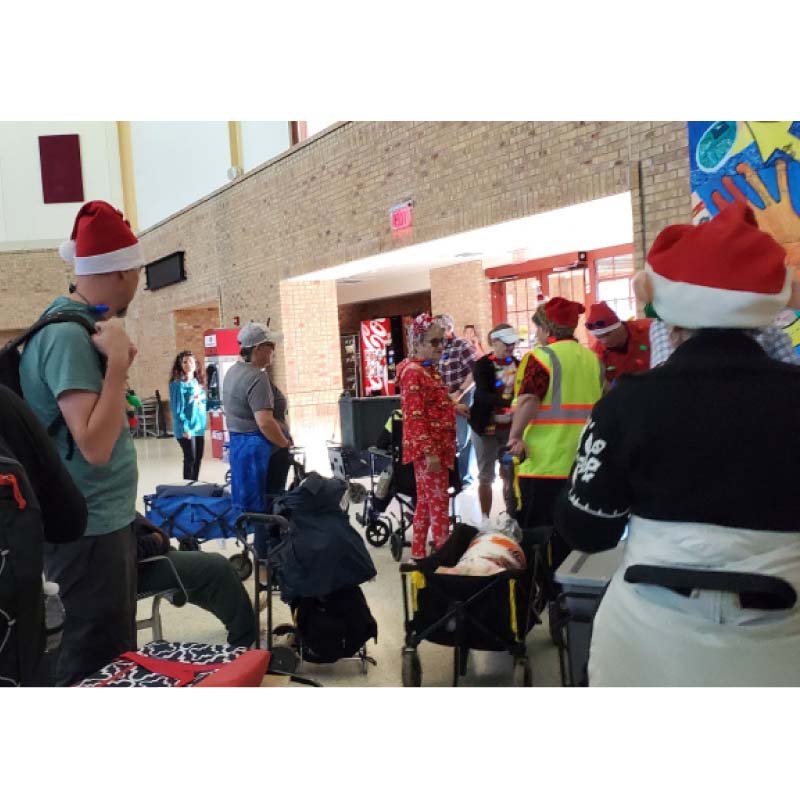“…Give me your tired, your poor,
Your huddled masses yearning to breathe free,
The wretched refuse of your teeming shore.
Send these, the homeless, tempest-tost to me,
I lift my lamp beside the golden door!”
– The New Colossus by Emma Lazarus as found in the Statue of Liberty, New York City

Passport – check.
Four quarters (US$1) going to Mexico, pedestrian toll fee – check.
Three dimes (US$0.30) return to US, pedestrian toll fee – check.
I do this repeatedly, zipping my bag countless times to make sure I have everything I need. I’m excited, I’m apprehensive. This was, after all, my first time to cross to Mexico for purely humanitarian reasons.
Team Brownsville
On Christmas Eve, I joined about 15 volunteers from Team Brownsville, in particular the subgroup Riverbenders, residents of a retirement community called Riverbend, composed mostly of winter Texans, to feed the asylum seekers numbering in the thousands – or so I was told.

We walked across the Gateway International Bridge over to Matamoros, Mexico from its twin border city of Brownsville, Texas. Team Brownsville, a volunteer group founded in July 2018, was created by educator volunteers to address the crisis that was unfolding between Matamoros and Brownsville and provide humanitarian assistance to asylum seekers.
It’s about a 10- to 15-minute walk, half a mile some say, to the so-called tent city after we get past immigration and the Rio Grande. Walking briskly, we pulled colorful wagons teeming with food (glazed ham and sweet potato casserole, coleslaw, homemade holiday cookies, lemonade mix), battery-powered Christmas light necklaces, paper goods for serving, books, crayons and Yuletide cheer past the usual line of Mexicans heading home to Matamoros and beyond. The food was cooked by the volunteers, either using their own money or from generous donors all over the country and the world.
Some of the volunteers – men and women coming from different parts of the United States – went all out in their holiday attire: sweaters emblazoned with Feliz Navidad (Merry Christmas in Spanish), donning Santa hats – some ingeniously crafted and bedecked with candy canes and little glitzy gift boxes – and twinkling Christmas light necklaces.
I wore a sedate red sweater, not the angpao (red envelope) red as I didn’t want to stand out since I’m the only Asian (and I suspect the youngest at that) in the group of mostly white and retired professionals.
I had to curb my curious and journalistic side as I was here to help and not to write. My mind was taking mental notes, of course.

Feeding asylum seekers
The mission was clear: to feed the thousands of asylum seekers and hopefully bring some Christmas cheer to these people who’ve left – escaped is probably the better word – the insecurity, poverty and gang or drug cartel violence that has ripped their home countries.
They are probably from failed nation-states in Central and South America like Honduras, El Salvador, Guatemala, Nicaragua, Guyana, Venezuela. Some come from as far as Africa like Ethiopia, Ghana, Cameroon. There were waves of migrants from China, India, Cuba, Uzbekistan, Russia among the nationals streaming from at least 30 countries seen through Brownville’s homeless shelter called Good Neighbor Settlement House when the asylum seekers were still allowed to wait for their hearings on the US side.
Yes, some of these homeless people are from Mexico itself escaping the drug cartel-infested regions. A number of them look like Mexican indigenous people. No, the Philippines is not found in the asylum seeker list since Filipinos have long used California and New York as their jump-off points of entry and escape. The TNTs (tago ng tago in Filipino as we call our undocumented/illegals) figure there’s really no need to go through Mexico to get to the US. We are, of course, a savvier lot; our illegals, I mean.
The asylum seekers are cooling their heels in Matamoros, classified by the US State Department as one of the most dangerous cities in Mexico because of drug cartel violence. Even middle-class Mexican-Americans hesitate to cross nowadays to Matamoros, more so the wealthier ones, to avoid being a kidnap/carnap victim.
The migrants are stranded in border cities like Matamoros waiting, sometimes for months, for summons to their asylum hearings in the US. This crisis exploded after US President Donald Trump and his administration decided to unfold its Migrant Protection Protocol (MPP), better known as “Remain in Mexico” policy in January 2019 to tighten the screws on immigration.
This policy requires asylum seekers to wait in Mexico until they are summoned by immigration courts.
The twin cities of Matamoros and Brownsville on the Mexico and US sides, respectively, are currently considered one of the epicenters of the humanitarian crisis that was spawned by President Trump’s anti-immigration policy.
Writing in Team Brownsville’s Facebook page, Andrea Rudnik, one of the founders, said MPP hit Brownsville in July and an initial group of 100 asylum seekers swelled to over a thousand in a refugee camp. Using money from grants and private donations to individual organizations, the camp now hosts a medical clinic, a legal clinic, a job placement resource center, an escuelita de la banqueta (sidewalk school), shower areas and port-a-potties since none or hardly any were reportedly provided before by the Mexican government.
Reporter Tom Phillips wrote on Dec. 20 for the UK-based The Guardian that “more than 57,000 people have been forced back into Mexico this year.” He added that “even when they do reach court after months of waiting, only a tiny proportion of applicants succeed. Research by academics at Syracuse University found that only 11 out of nearly 10,000 asylum requests were granted in the first nine months of this year (2019).”
The American Immigration Council, a Washington DC-based nonprofit organization that advocates immigrants’ rights, explained that “to be admitted as refugees, individuals must be screened by multiple international and US agencies and demonstrate a ‘well-founded fear of persecution based on race, religion, membership in a particular social group, political opinion, or national origin.’
“Asylum seekers are individuals already in the US who fear returning to their home countries, and who must prove they meet the definition of a refugee.
“An immigrant does not qualify as a refugee or an asylee because of poverty or difficult economic conditions in their home country.”

Tent city
We arrived at the plaza, also known as tent city, where camping tents dotted the concrete pavement, home to an estimated 2,500 people as reported in media. Our enthusiastic welcome party of two – a boy and a girl probably no more than preschool age and seeing familiar and friendly faces – ran to give the volunteers a tight but quick hug.
My contact for the volunteer group was my son’s former preschool teacher, Jan Fliegel, one tireless volunteer as she and her husband Mark, who was the group’s de facto Spanish translator, had already crossed twice earlier that day to bring supplies that would be needed for this feeding. She spoke familiarly with some of the kids and adults that followed behind the two enthusiastic preschool greeters.
As one volunteer sang “Jingle Bells” behind me, long white tables were repositioned and cleaned with anti-bacterial wipes. Two queues quickly formed to get the feeding underway. On our side, I was assigned to pass out plastic forks, knives and napkins as other volunteers served the ham, scooped the slaw and sweet potato casserole, handed out a cookie or two and poured the lemonade drinks.
I’ve never greeted so many Feliz Navidades in my life. Probably around 500 times since we were ready to feed a thousand at the very least. The group that came through were mostly women and children of different age groups, a lot of them young-looking, probably no more than 30 years old for the adults. Some kids, barefoot, had a hard time carrying their plates laden with this special Christmas Eve meal.
You’d be amazed at how others, both adults and kids, tried to juggle two or three plates and their styro cups as they shyly smiled and wished me back good tidings or mouth gracias (thanks in Spanish) or Dios te bendiga (God bless you in Spanish). Some had nice-looking clothes on while others wore worn food-stained shirts, uncombed, unshod and unwashed.
You’d know which kids have their families with them and even for a Divisoria (the flea market capital of the Philippines)-bred person like me used to seeing poverty up close, it pains my heart to see these little kids, some of them seeming unaccompanied. They are probably not more than 3 or 4 years old, barefoot, trying to walk and balance their plates without any adult helping them, white foam cups with lemonade held precariously on the verge of spilling.
Some of them have dirt-stained – or are they tears? – faces. Some of them exhibit innocence – a lost, blank or dazed look even as they held tightly on to their grub for the day. One has to steel oneself against repeated scenes like these and continue serving. I wonder if they can even talk or communicate if they are forcibly separated this young from everything familiar and familial. Cruel!
After our volunteer singer took a break, Jose Feliciano’s Christmas song “Feliz Navidad” piped in through the loudspeakers and must have played a thousand times to fill the void and continue the afternoon of merrymaking. It is, after all, Christmas Eve. Then it became the Spanish folk song “Campana sobre campana (Bells upon bells)” that blared out.

Santa’s here
As dark overtook dusk, all the flickering battery-powered Christmas light necklaces that we wore were given away, plus hundreds more, mainly to the children to provide illumination and fun. I surrendered an old extra no-twinkling-lights necklace that I brought along when a volunteer asked if I could part with it.
I hardly asked any questions nor did I take too many pictures during the brief lulls in feeding that we had since I’m hyper-aware that I was there mainly to help and not to document, although I wished I could do both.
I met a Japanese photographer formerly based in New York that parachutes into news hotspots and photojournalist Maranie Rae Staab who’s repping for Vice News (I’m like “umm, what’s that” – Vice is a totally Gen Z (?) kind of news outlet). She documents in photos and words so movingly the fate of refugees around the world. Recounting the feeding on Christmas Eve later, Staab wrote that over 500 pounds of ham, 300 pounds of sweet potato casserole, 100 pounds of coleslaw, 3,600 homemade Christmas cookies “were served by our group that day. They said we fed a thousand people on Christmas Eve.”
After a couple of hours, the feeding slowed to a trickle as everyone had their fill. Next up was what kids all over the world always wish for during Christmas Eve: a visit with Santa. Though not as burly, this Santa did not disappoint as a gaggle of kids followed him when he showed up. On the side, older kids lit up their sparklers (lusis in Filipino) though they were warned to be careful lest they start a fire, since the tents were so tightly packed in the plaza.
Good Samaritans
A few minutes later, then it was time for Team Brownsville to pack up, I did not dare stray from the group since apart from Jan and her husband, I didn’t know the others nor did I bother to ask for their names, as some people would rather do their acts of charity anonymously.
I may not even see the other volunteers in the future if they were just visiting Brownsville for this specific purpose of helping the migrants/asylum seekers, taking a break from their harried professional lives in the North. Later, I found out that some of them came from New Jersey or were Minnesota transplants.
I didn’t want to be labeled nosy since I’m just there as a volunteer too. I’m not even sure when I can cross back as I have to wait for my husband to have a work-free day to bail me out in case of trouble.
Besides, it was Christmas Eve and I promised my family that I would join them for a midnight mass at the Methodist church so there’s no room for delay. A young male helped push my almost empty but still heavy wagon up the ramp. We walked back to Brownsville past 7:15 p.m., repacked but almost emptied of provisions except for a mound of coleslaw and whatever little leftovers we had. I was checked in by a Border Patrol agent who told me that he had been to Cebu before.

Back in Brownsville’s bus station which was our meeting point, a well-dressed black leather jacket, cap-wearing Hispanic male approached us, car cleaning stick in hand, demanding in Spanish to be fed. W When he was told that most of what was left was coleslaw and he can have as much as he wants, he started raining “chingados” (slang for damn and F**K) on the group, saying he’s not a conejo (Spanish for rabbit). Because of his rude, demanding behavior (he was probably high and/or drunk) the elders in the group decided not to give him any food and put everything away in the vans/cars that they left parked.
I was just worried that in his frenzied state, he may start swinging his cleaning stick and physically attack us since he was already verbally assaulting and haranguing us. It was really time to go. Crazy times sometimes breed crazy people.
Meaningful Christmas
Overall, it was one of the best Christmas celebrations I’ve ever had, spending time meaningfully with people, complete strangers at that, who I know need help the most at their most vulnerable moments.
The asylum seekers won’t be able to repay this group of volunteers in any way except to just continue persisting in their pursuit of a better life for themselves and their children.
We may have filled them up physically for the night but I’d like to think they have filled us up spiritually. I know, I have been filled. And, for most of the volunteers who are repeat offenders (of good works), their relentless efforts to help feed thousands of migrants is testament to that fulfillment in my opinion.
“…Whatever you did for one of the least of these brothers and sisters of mine, you did for me…” Matthew 25:40
P.S. As I’m writing this, I came across three pieces of disturbing news: An asylum seeker, out of desperation perhaps, slit his throat with a knife on a bridge across the Rio Grande, Reuters reported, after he was refused entry to the US.
That’s the first reported suicide for the year. Countless other stories of men’s inhumanity vs (wo)men just keep on piling up. Endless stories of multiple rapes, beatings, torture, machete hacks… victims revictimized …
Two, BuzzFeed News reported the Trump administration will now deport Mexican asylum-seekers who come to the US’s southern border, to Guatemala.
And this just in from the National Public Radio (NPR) news: Texas Governor Greg Abbott says new refugees won’t be allowed to resettle in Texas, making it the first state to refuse after over 40 governors have signaled their willingness to accept refugees.
Seems like Feliz Navidad just might become a whole lot sadder this year!
